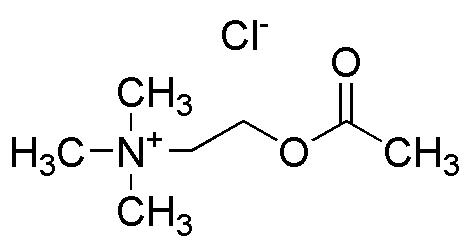Acetylcholine chloride is widely utilized in research focused on:
- Neuroscience Research: It serves as a crucial neurotransmitter in studies examining synaptic transmission and neuronal communication, helping researchers understand various neurological disorders.
- Pharmacology: This compound is used in drug development to test the effects of potential medications on cholinergic systems, providing insights into treatments for conditions like Alzheimer's disease.
- Muscle Physiology: It is applied in experiments to investigate muscle contraction mechanisms, aiding in the development of therapies for muscle-related diseases.
- Biochemical Assays: Acetylcholine chloride is employed in enzyme activity assays, particularly for acetylcholinesterase, which is vital for understanding pesticide effects and developing antidotes.
- Education and Training: In academic settings, it is used in laboratory courses to teach students about neurotransmitter functions and their roles in human physiology.
Informations générales
Propriétés
Sécurité et réglementation
Applications
Acetylcholine chloride is widely utilized in research focused on:
- Neuroscience Research: It serves as a crucial neurotransmitter in studies examining synaptic transmission and neuronal communication, helping researchers understand various neurological disorders.
- Pharmacology: This compound is used in drug development to test the effects of potential medications on cholinergic systems, providing insights into treatments for conditions like Alzheimer's disease.
- Muscle Physiology: It is applied in experiments to investigate muscle contraction mechanisms, aiding in the development of therapies for muscle-related diseases.
- Biochemical Assays: Acetylcholine chloride is employed in enzyme activity assays, particularly for acetylcholinesterase, which is vital for understanding pesticide effects and developing antidotes.
- Education and Training: In academic settings, it is used in laboratory courses to teach students about neurotransmitter functions and their roles in human physiology.
Documents
Fiches de données de sécurité (FDS)
La FDS fournit des informations de sécurité complètes sur la manipulation, le stockage et l’élimination du produit.
Spécifications du produit (PS)
Le PS fournit une description complète des propriétés du produit, notamment sa composition chimique, son état physique, sa pureté et les exigences de stockage. Il détaille également les plages de qualité acceptables et les applications prévues du produit.
Certificats d'analyse (COA)
Recherchez des certificats d'analyse (COA) en saisissant le numéro de lot du produit. Les numéros de lot et de lot se trouvent sur l'étiquette d'un produit, après les mots « Lot » ou « Lot de fabrication ».
Numéro de catalogue
Numéro de lot/série
Certificats d'origine (COO)
Ce certificat d'exploitation confirme le pays dans lequel le produit a été fabriqué, et détaille également les matériaux et composants utilisés et s'il est issu de sources naturelles, synthétiques ou autres sources spécifiques. Ce certificat peut être requis pour les douanes, le commerce et la conformité réglementaire.
Numéro de catalogue
Numéro de lot/série
Fiches de données de sécurité (FDS)
La FDS fournit des informations de sécurité complètes sur la manipulation, le stockage et l’élimination du produit.
DownloadSpécifications du produit (PS)
Le PS fournit une description complète des propriétés du produit, notamment sa composition chimique, son état physique, sa pureté et les exigences de stockage. Il détaille également les plages de qualité acceptables et les applications prévues du produit.
DownloadCertificats d'analyse (COA)
Recherchez des certificats d'analyse (COA) en saisissant le numéro de lot du produit. Les numéros de lot et de lot se trouvent sur l'étiquette d'un produit, après les mots « Lot » ou « Lot de fabrication ».
Numéro de catalogue
Numéro de lot/série
Certificats d'origine (COO)
Ce certificat d'exploitation confirme le pays dans lequel le produit a été fabriqué, et détaille également les matériaux et composants utilisés et s'il est issu de sources naturelles, synthétiques ou autres sources spécifiques. Ce certificat peut être requis pour les douanes, le commerce et la conformité réglementaire.


